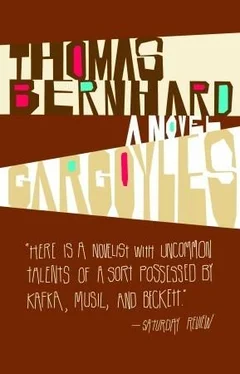There were moments when I felt empowered to see right through the whole of creation. “Moments of pure recreation,” I said, though they left me exhausted.
Every day I completely built myself up, and completely destroyed myself.
Self-control, I said, is the satisfaction of using your brain to make the self into a mechanism that obeys your command.
Only through such control can man be happy and perceive his own nature. But very few people ever perceive their natures. To let the feelings predominate, to do nothing against the normal gloominess of the emotions, delivers people up to despair. Where the reason is in control, I said, despair is impossible. “Whenever this state of total irrationality closes down on me, there is nothing but despair inside me.” Nowadays I only very rarely succumb to this state, I said. Life always seemed grim if you did not step outside it; the satisfaction came from enduring it rationally. Most people were governed by their emotions, not their reason, I said, and the result was that most sank into despair. “But the kind of reason I mean,” I said, “is completely unscientific.”
My father had been struck by my sudden loquacity. He commented that he too sometimes found himself talking about something, or even only seeing something he could not put into words, which was actually out of the question for people, was really humanly impossible.
Passing Bloch’s house, we drove toward Hauenstein to call on a more or less crazy industrialist whose name I have forgotten. From Abraham we took a short cut over Geistthal.
Students were always prey to a kind of restlessness, I said, because as long as they are at school they live in a no-man’s land between the parents they have left behind and the world they cannot yet attain, and their instincts still draw them back to their parents rather than toward the world. There are often tragedies inside that no-man’s land, which happen when they realize that they can neither return to their parents nor step out into the world. In the last six months in my dormitory alone three students have killed themselves, I said. Up to the last, there had not been the slightest symptom of emotional or psychic trouble in any of the three.
I myself had never even thought of taking my life, I said. But my father remarked that the idea of suicide had always been a familiar one to him. Even as a child, when other ideas became too much for him, he had often sought refuge in this idea. But whenever the idea did come into his head, it had always taken the form of an alternative that made life possible, hence something rather restful, never something in its own right. Both of us were thinking how dangerous it was to have my sister continually absorbed in thoughts of suicide, either brooding about it or actually attempting it. From the time she was little she had inclined toward self-destruction. What had first been a bit of dramatics, my father said, might later develop into a genuine emotion that could end in the real thing.
Beyond Abraham the hills were covered with large orchards. The farmers had set out their casks of cider in the sun. The houses are old. There is hardly a more isolated region than that between Geistthal and Hauenstein.
We had stayed much too long in Stiwoll, my father said. He had been expected all morning in Hauenstein, which was where the industrialist had his hunting lodge. He had retired there to devote himself to a literary work over which he agonized, even as it kept his mind off his inner agony. The man was not yet fifty; my father had known him for some two years. His half-sister shared his solitude with him; she was, as I would shortly see, perfect for this role — ideal, as the man himself put it. He had bought the hunting lodge some fifteen years ago from Prince Saurau, whom we would next visit at Hochgobernitz Castle. Even as long ago as that, the industrialist had began conceiving this literary work on a “purely philosophical subject” that he would never talk about. If he talked about it, the industrialist repeatedly told my father, if he even began talking about it, he would then and there ruin the work, which had made such notable progress. And he would no longer be able to start again from the beginning. He was wont to say that he worked day and night, writing and destroying what he had written, writing again and again and destroying again and again, but approaching his goal. Aside from his work he permitted himself no diversion except the briefest talks with his half-sister in the library or in the kitchen, and then only for the purpose of settling questions of the meals. Twice a week his half-sister would go to Geistthal to shop, mail letters, and fetch their mail. They had enormous supplies in their hunting lodge in case of what they called “the disaster,” which supplies were never touched. The half-sister was his mother’s daughter, by a Chilean father; and as we slowly neared Hauenstein, my father explained their relationship. They lived together like man and wife. She would withdraw to her room immediately after admitting my father to the lodge and reporting his presence, and she would reappear only to let my father out again.
The industrialist suffered from diabetes, my father said, and had to administer injections to himself every few hours. Twice or three times a month my father called to check on the state of his disease. As far as my father knew, the couple never received anyone else except himself. He had often asked people in the vicinity whether anyone ever visited the lodge, especially anyone from the city, but apparently no one ever did. The house certainly gave the impression of being inhabited solely by the industrialist and his half-sister. It felt as if no other soul had entered it for decades. It was not, as such hunting lodges usually are, filled with hunting gear, but was almost empty; it contained only the barest necessities. Even in the half-sister’s room there was nothing but a bed, a table, a chest, and an easy chair. No pictures on the wall, not a picture in the whole house. The industrialist said he hated pictures. He wanted everything as empty as possible, as bare as possible. What little there was had to be as simple as possible. He regarded the dense woods around the lodge as a kind of wall. The mailman was allowed to enter this wall with telegrams, but not step inside the house; he had to call until the half-sister came to the door. There was a spring behind the house, my father said — excellent water.
We were now in a high valley and driving through nothing but woods and more woods.
There was not a single book in the industrialist’s house, my father said; he deliberately kept books out of the house in order not to be irritated. After all, nothing is more irritating than books if you want to be alone, must be alone.
He allowed his half-sister to read newspapers, including Le Soir, Aftonbladet, Le Monde , and La Prensa —not a single German newspaper. But even these foreign papers had to be at least a month old so that, as the industrialist said, they would have no power of destruction, would be already poetic.
The industrialist’s clothing was plain; my father had never seen him wearing anything but a shirt and slacks. He was said to speak not only all Central European languages, but also virtually all Far Eastern tongues.
Aside from a desk and chair, all he would have in his study was blank paper, so that he would be thrown entirely on his own resources and never diverted from his work. As for the subject-matter of his writing, he would say, he had the experience acquired in more than forty years in the metropolises of the world, in the industrial and commercial centers of all five continents.
His possessions were scattered throughout the whole world, chiefly in English-speaking countries. The industrialist ran his enterprises from Hauenstein; that took only an hour a day. A tremendously complicated apparatus, which was constantly in motion and included more than forty-thousand employees, was kept going from Hauenstein, and functioned better all the time.
Читать дальше












